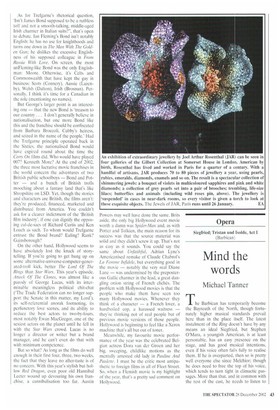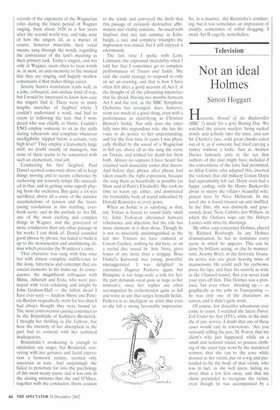Mind the words
Michael Tanner
The Barbican has temporarily become the Bayreuth of the North, though fortunately higher musical standards prevail here than in the place itself. The latest instalment of the Ring doesn't have by any means an ideal Siegfried, but Stephen O'Mara, a youngish American, is at least personable, has an easy presence on the stage, and has good musical intentions, even if his voice often fails fully to realise them. If he is overparted, then so is pretty well everyone else since Melchior; though he does need to free the top of his voice, which tends to turn tight in climactic passages. More than that, and in common with the rest of the cast, he needs to listen to
records of the exponents of the Wagnerian roles during the finest period of Wagner singing, from about 1920 to a few years after the second world war, and take note of how the singers all, as a matter of course, however miserable their vocal means, sang through the words, regarding the conveyance of the text's meaning as their primary task. Today's singers, and not only in Wagner, seem often to treat words as, at most, an aide-memoire to the musical line they are singing, and happily swallow consonants if that makes things easier.
Jeremy Sams's translation reads well, in a joky, colloquial, anti-archaic kind of way, but I would be interested to know how easy the singers find it. There were so many lengthy stretches of Siegfried where I couldn't understand a word, and had to resort to following the text, that I wondered who was chiefly to blame. Couldn't ENO employ someone to sit in the stalls during rehearsals and complain whenever intelligibility slipped below a certain, very high level? They employ a fearsomely large staff, no doubt mainly of managers, but none of them seems to be concerned with such an elementary, vital job.
Conducting his first Siegfried, Paul Daniel seemed concerned above all to keep things moving and to secure coherence by eschewing any leisurely tempi. He succeeded in that, and in getting some superb playing from the orchestra. But quite a lot was sacrificed, above all a sense of the massive accumulations of tension and the hearteasing resolutions in this startling, everfresh score; and in the prelude to Act III. one of the most exciting and complex things in Wagner. and the graveyard of more conductors than any other passage in his works I can think of, Daniel sounded good phrase by phrase, but failed to build it up to the monumental and annihilating climax which precedes the Wanderer's entry.
That character was sung with fine tone but with almost complete indifference to the irony, bitterness and contempt that are crucial elements in his make-up. In consequence, the magnificent colloquies with Mime, Alberich and Erda, who were portrayed with vivid colouring and insight by John Graham-Hall — the tallest dwarf I have ever seen — Andrew Shore and Patricia Bardon respectively, went for less than I had always thought they were bound to. The most controversial casting continues to be the Brininhilde of Kathleen Broderick. I thought her thrilling in The Valkyrie, but here the intensity of her absorption in the part had to contend with her technical inadequacies.
Briinnhilde's awakening is enough to intimidate any singer, but Broderick, conveying with her gestures and facial expression a bemused ecstasy, seemed only uncertain in tone. And surprisingly she failed to penetrate far into the psychology of this most meaty scene: and it was only in the closing minutes that she and O'Mara, together with the conductor, threw caution to the winds and conveyed the thrill that this passage of curiously destructive affirmation and vitality contains. As usual with Siegfried (but not last summer in Edinburgh, a rare and complete triumph) the impression was mixed, but I still enjoyed it enormously.
The last time I spoke with Lotte Lehmann, she expressed incredulity when I told her that I sometimes go to complete performances of Tristan und Isolde. She said she could manage to respond to only an act an evening, and that is how I have often felt after a good account of Act I, at the thought of all the exhausting intensities that lie ahead. Having two months between Act I and the rest, as the BBC Symphony Orchestra has arranged, does, however, seem too much of a good thing, even with a performance as electrifying as Christine Brewer's Isolde. Not only does she enter fully into this stupendous role, she has the voice to do justice to her understanding, and for the first time in years I was physically thrilled by the sound of a Wagnerian in full cry, above all as she sang the curse on Tristan, and wished for death for them both. Almost no soprano I have heard has retained such musicality under that duress. And before that, phrase after phrase had taken exactly the right expression, because she sang them as beautifully as possible (as Shaw said of Patti's Elisabeth). She took no time to warm up, either, and dominated the formidable body of sound unleashed by Donald Runnicles at every point.
When an Isolde is as satisfying as that, any Tristan is bound to sound fairly small fry. John Treleaven alternated between vehemence and abjection, but the role has more elements in it than those. Though he is not so miserably undistinguished as the last two Tristans we have endured at Covent Garden, nothing he did here, or on a recital disc issued by Arte Nova, gives hopes of any more than a stopgap. Boaz Daniel's Kurwenal was young, powerful, unexaggerated. I was delighted to encounter Dagmar Peckova again. but Brangane is too large-scale a role for her: the part demands vocal guns as large as her mistress's, since her replies are often accompanied by orchestration quite as full and noisy as any that surges beneath Isolde. Peckova is so intelligent an artist that even so she left a strong favourable impression. So, in a manner, did Rurinicles's conducting, but it was sometimes an impression of crudity, sometimes of wilful dragging. I await Act II eagerly, nonetheless.



























































 Previous page
Previous page